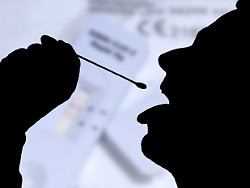Wednesday, February 24, 2021
Visits to the theater possible again
Spahn promises freedom through new tests
After Health Minister Spahn had to take a lot of criticism because the free rapid tests will not be available on March 1st, he justified himself in the Bundestag. Instead of talking about a "fiasco", Spahn prefers to outline the new freedoms that are now waiting for the Germans.
Federal Minister of Health Jens Spahn has promised the population more freedom in the corona lockdown by expanding the tests. Quick and self-tests would help step by step, "to have a bit more freedom again," said Spahn in the Bundestag in Berlin. Overall, it was possible to break the pandemic dynamics quite a bit. But now the more contagious virus variants have spread. The main reason why the mutation is more contagious is that an infected person is more contagious for longer. "We thought we were on the right track, but this virus doesn't just give up," said the CDU politician. The number of infected people is currently no longer falling. "That is exhausting."
The Federal Institute for Drugs and Medical Devices had issued the first three special approvals for corona self-tests, which you can do at home without training, in the morning. Rapid tests, which must be carried out by trained staff, should probably be able to be carried out free of charge in around two weeks, for example in pharmacies. The Minister of Health explained that lay self-tests are suitable if someone wants to be safe for himself. In the future, however, they could also serve to enable visits to theaters or other events. "That's the perspective." After the first three self-tests have been approved, they are not immediately available everywhere. But he is very confident that significantly more tests will come onto the market week after week. Rapid tests, on the other hand, are the first choice wherever a result documented by a third party is required – for example when traveling.
"Nothing is free – someone always pays"
Meanwhile, Spahn also wants to make the availability of free corona self-tests for the general public dependent on market prices. "The question of subsidizing the purchase depends very much on the prices," the minister said. It is not yet known how expensive the tests that have already been approved in retail are. "For me it makes a difference whether a test costs two euros or ten euros." Accordingly, one also has to discuss the question of the subsidy and whether the tests should also be free of charge for everyone. "Nothing is free – someone always pays," said Spahn.
With regard to the situation in Austria, where corona self-tests for at home in pharmacies will be offered from March 1, Spahn said that the admission requirements for self-tests are higher in Germany. "It's not enough for me if the manufacturer signs a slip of paper and says: the tests are good." In this country, studies on the quality of the tests are to be submitted. If tests are to be made into an instrument for the pandemic, they must also provide sufficiently good results.
Spahn also defended himself against the harsh criticism from the federal states and from the opposition because he had promised the introduction of the free self-tests initially for March 1, but then backed down. Some debates had hardened over time, said Spahn. But everyone involved tried to get the situation under control – "with caution, with vaccination, with testing".
.
